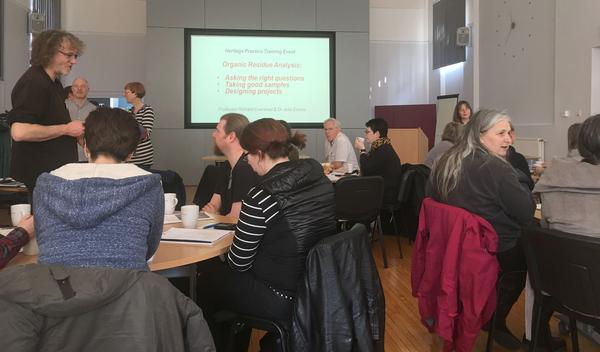On Thursday 23 March Ashley Tuck and Jess Tibber from the Wessex Archaeology Sheffield Office attended a Historic England Heritage Practice programme addressing Organic Residue Analysis (ORA) and Pottery Production Sites. It was a full day of talks and interactive sessions, chaired by the local Science Advisor Andy Hammon.
Introducing the principles and potential applications of organic residue analysis, it was very exciting to hear how the field has been developing, and the possibilities, including the prospect for radiocarbon dating pottery in the near future. Absorbed residues were shown by Evershed in ‘Organic residue analysis in archaeology: the archaeological biomarker revolution’ (2008) to survive in >80% of domestic cooking pottery assemblages worldwide. Although this can vary, it shows just how much potential additional information is waiting to be discovered! Dairy fats, carcass fats, plant waxes, beeswax and resins can all be separately identified and help us to better characterise pottery uses across sites and regions. The training session also covered the importance of targeted questions when considering the use of this technique, and the best practice for onsite retrieval, and post-excavation treatment of pottery samples.
The afternoon session was about anticipating and locating pottery production sites, and understanding the available methods and strategies for examining and recording these types of site. Local ceramic specialist Chris Cumberpatch gave a talk about the existing production sites which we are currently aware of in South Yorkshire, and the crucial importance of how we deal with any future sites in the area.
The day was very thought-provoking, and it also provided a fantastic opportunity to meet fellow heritage professionals and discuss the potential for applying these techniques to past and future Wessex projects.
For further information please see:
- Source: Wessex Archaeology

